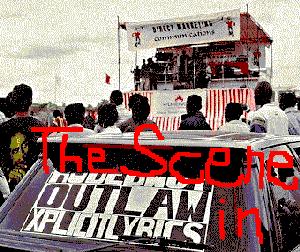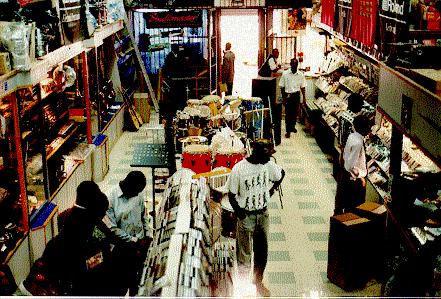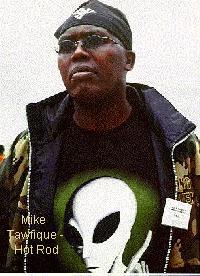

Among the three cities Nairobi is the most cosmopolitan with lots of input of goods and ideas from the North. A sign of this was that the first Nairobi carnival took place during our visit on October 11, 1997. The Brazilian/West Indian carnival concept is certainly a form of cultural event that is spreading rapidly, mostly with the London copies of West Indian carnivals as model.
In Nairobi the music business is more advanced than in Dar or Lusaka. You can find a couple of digitalized recording studios such as Sync sounds and Samawati Productions. There are also a few record shops such as Musikland there international repertory is sold. CD:s have gradually become more common in Nairobi, but cassettes are the main phonogram medium in Kenya.
There are, however, almost no active local record companies. Samawati Productions are issuing a few cassettes. The veteran Nairobi company A.I. Records is now only an agent for international companies. CBS, EMI and Polygram who used to run subsidiaries have left. The reason is difficulties to deal with the Nairobi business environment and piracy.

As in the other cities musicians and bands have to try to produce and market their own cassettes if they want to be feature on phonogram. We found only one locally produced CD with the ragga artist Hardstone, issued by Sync Sounds in cooperation with a German company. The main complaint among musicians was the lack of recording companies.
The government Kenya Broadcasting Corporation (KBC) is broadcasting quite a lot of Kenyan traditional and popular music. The traditional music is mainly heard in the broadcasts in vernacular languages. The popular music is mainly the older Kenyan styles such as benga, but also a lot of soucous and other popular styles from The Peoples Republic of Congo (former Zaire). The English service has quite a lot of Anglo-American pop music, but KBC does not feature very much ragga/reggae or rap music.

In Nairobi we found a few bands playing rock music as well as "afro jazz", rap and funk, which we hardly could find in the other two cities. One of these bands, Hot Rod, had a very active manager, Mike Tawfique, who were among the organizers of the first big outdoor pop/rock festival in Nairobi in October 1997 (photo at top of page).
Gospel is common in local versions, especially in Kikuyu versions. We talked to a few gospel people, such as the Blessed Ambassadors. Gospel Melodies International with its dynamic leader Lincoln Kariuki, and Winds of Prayer with Agustus Baraza. The churches often have relatively good finances and recognize the value of music in their mission.
Reggae and ragga seemed to be more popular than rap in Nairobi. There were at least two clubs that regularly featured reggae and ragga artists: Monte Carlo and Hollywood. Monte Carlo looked very much like a dance hall in Kingston, Jamaica. There were quite a few ragga artists taking turns at the mike. The poineers of reggae music in Nairobi are the Kalanda brother with their band Them Mushrooms. They started to play reggae already in the seventies laying the foundation for the popularity of reggae in Kenya.
The hip hop was certainly also present in Nairobi. But it seemed to be a quite small group. We found a few cassettes in the record shops with local reggae and ragga, and even the new CD by Hardstone. We didn't find any rap cassettes in the shops.
Here are presentations of some of the performers in Nairobi:
| HARDSTONE | JAH-MBO REBELS BAND | JAMIJ MOJA Titti Solomon |
SAMJIM |
|---|---|---|---|
| THEM MUSHROOMS | HOT ROD | JIMMY AMBOLE | JAMES OLWANO LUKAYE |
| GOSPEL MELODIES INTERNATIONAL Lincoln Kariuki |
BLESSED AMBASSADORS World Ministries |
|---|
 |
|---|